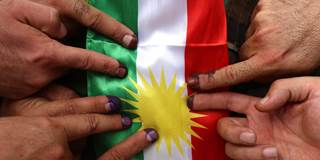There is not and should not be any automatic right of self-determination, not least because a world of frequent secession would be in even greater disarray than the world we already have. To gain international recognition, secessionist entities should meet five key criteria – and Iraq's Kurdistan Region satisfies all of them.
NEW YORK – Returns show a high percentage of Iraq’s estimated eight million Kurds turned out to vote in a referendum on independence for the Kurdistan Region and other areas of the country with a substantial Kurdish population. An even higher proportion of voters – reported to be above 90% – voted yes. Much of the world, though, is unsympathetic, and statehood in today’s world depends on recognition by other states. So what happens now?
To be sure, there is not and should not be any automatic right of self-determination. It was one thing for people in colonies ruled by governments thousands of miles away and deprived of many of their rights to opt for independence in the wake of World War II. It is something else altogether for a region to secede from an existing independent country. A world of frequent secession would be in even greater disarray than the world we already have.
The question then naturally arises: under what circumstances should leaders and populations seeking to leave one country and establish their own be supported? There is no universally accepted set of standards, but let me suggest some that should be applied:

NEW YORK – Returns show a high percentage of Iraq’s estimated eight million Kurds turned out to vote in a referendum on independence for the Kurdistan Region and other areas of the country with a substantial Kurdish population. An even higher proportion of voters – reported to be above 90% – voted yes. Much of the world, though, is unsympathetic, and statehood in today’s world depends on recognition by other states. So what happens now?
To be sure, there is not and should not be any automatic right of self-determination. It was one thing for people in colonies ruled by governments thousands of miles away and deprived of many of their rights to opt for independence in the wake of World War II. It is something else altogether for a region to secede from an existing independent country. A world of frequent secession would be in even greater disarray than the world we already have.
The question then naturally arises: under what circumstances should leaders and populations seeking to leave one country and establish their own be supported? There is no universally accepted set of standards, but let me suggest some that should be applied: